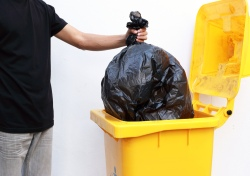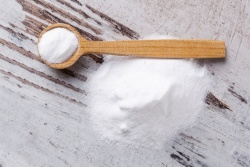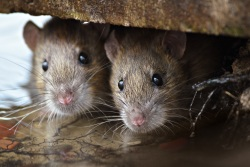Cleaning out an outdoor bin is far from exciting, more especially if the trash has been piling up and simmering for more than a week.
 Overflowing bins that go uncollected create a stink, attract flies and maggots, and encourage rats to feed on the piles of dirt and decay.
Overflowing bins that go uncollected create a stink, attract flies and maggots, and encourage rats to feed on the piles of dirt and decay.Overflowing bins that go uncollected create a stink, attract flies and maggots, and encourage rats to feed on the piles of dirt and decay.
With the ongoing strike, it has never been more important to manage and clean your outdoor bin. A good scrub, using disinfectant as well as being mindful of your household waste will go a long way in reducing odours and unwanted pests.
Here’s how to clean and sanitise your outdoor bin…
Give it a scrub
Before you start cleaning your bin, move it into a suitable location - somewhere near a water source and drain. This will make the cleaning process easier and quicker.
Wipe the outside before dunking a bucket of hot soapy water inside the bin. You can add a capful of disinfectant to the water as this will help tackle any odours and bacteria lurking in the bin.
Use a mop to clean the inside of the bin. Manoeuvre the mop so that you can reach and remove any visible signs of dirt and grime. Once you’re happy, toss out the dirty water, rinse the bin and let it air dry.
Get rid of maggots
 To deodarise your bin, leave a generous amount of baking soda inside the rubbish bin overnight.
To deodarise your bin, leave a generous amount of baking soda inside the rubbish bin overnight.Maggots are fly larvae that form part of the food chain that helps breakdown rotting organic matter like food scraps.
They flourish in warm, moist surroundings and develop quickly into adults.
Nobody wants maggots in their wheelie bins so, to prevent an infestation, ensure that the bin lid is always closed. This will keep flies from laying their eggs in your rubbish, eliminating the potential of having maggots.
If you’ve had a case of maggots, you want to get rid of them quickly. Once you’ve emptied out your garbage can, douse the maggots in hot water. This will kill them and give you the opportunity to disinfect your bin without all the wriggling.
Using a good quality bleach to sanitise your bin will destroy the bacteria and any remaining eggs.
Deodorise smelly bins
Having a smelly bin around is unpleasant, especially if it’s located close to your house. Fortunately, there are a few things that can be done to eliminate bin odours.
As soon as you empty your trash can, give it a good hose-down with extra strength soap and water.
 Pick up any trash that has fallen out of the dustbin and clean up any spills immediately. When you take away access to food, the rats will go somewhere else to find a meal.
Pick up any trash that has fallen out of the dustbin and clean up any spills immediately. When you take away access to food, the rats will go somewhere else to find a meal. If you still get an unpleasant smell, splash some vinegar in the bin. Add a bucket of hot water to the mix, let the solution sit for an hour, empty the bin and let it air dry.
Alternatively, you can leave a generous amount of baking soda inside the rubbish bin overnight.
Once the bin is dry, place some newspapers at the bottom. These will absorb any liquids which help accelerate the decomposing process.
Keep rats at bay
Keep rats from feeding on your garbage by securing your wheelie bin. To keep the rats away, always keep the lid down. Pick up any trash that has fallen out of the dustbin and clean up any spills immediately. When you take away access to food, the rats will go somewhere else to find a meal.
Additional outdoor bin tips
 Solid waste from disposable nappies should go down the toilet. Once that’s done, double bag the nappies before popping them in the bin.
Solid waste from disposable nappies should go down the toilet. Once that’s done, double bag the nappies before popping them in the bin.1. Rinse food packaging like tins and bottles before putting them in the bin. This will help minimise the odours - or even better start recycling to reduce the waste.
2. Keep food scraps in a sealed container in the kitchen or freezer until they can be disposed of - and consider making your own compost if you have a garden.
3. Double wrap litter tray remnants, pet waste, and meat and fish scraps in plastic bags before putting them in the bin.
4. Solid waste from disposable nappies should go down the toilet. Once that’s done, double bag the nappies before popping them in the bin.
5. Tie all plastic bags securely
6. Move your bin to a cooler spot on a hot day. – Katlego Sekano







